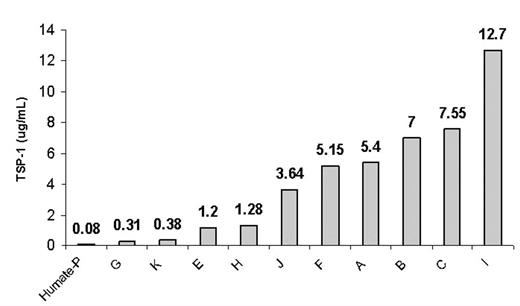Abstract
Von Willebrand factor (VWF) is a multimeric protein that mediates adhesion of platelets to sites of vascular injury and is therefore essential for primary haemostasis. The modulation of VWF multimers size is critical to the control of the hemostatic activity, where the large multimeric forms are most hemostatically active. It has been shown that various proteases, such as Thrombospondin-1 (facilitates reduction of the disufide bonds), are critical in the degradation of VWF multimers. This might be an important aspect for VWF coagulation factor concentrates used in the treatment of von Willebrands disease, best treated with high molecular weight VWF multimers and least content of human TSP-1 (huTSP-1).
Determination of huTSP-1 (ChemiKine EIA Kit der Fa. Chemicon International, USA) were done in 11 commercially available VWF/FVIII-concentrates (3 different batches each) in duplicates. HuTSP-1 content in the VWF/FVIII concentrates varied from 0,08 ug/mL to 12,7 ug/mL (variance in all duplicates less than 15%), as shown in the figure.
The results show a significant difference in huTSP-1 content. VWD patients might receive as much as 250 ug huTSP-1 or even higher during a single treatment course. If the huTSP-1 is still active, requires further investigations.


This feature is available to Subscribers Only
Sign In or Create an Account Close Modal